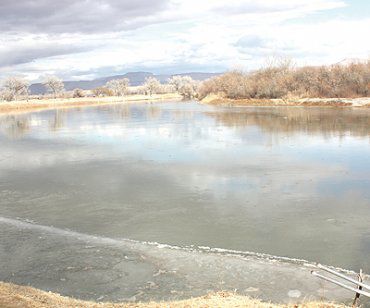A Jan. 20 decision by the Utah State Engineer has removed a major state barrier to a proposal to build Utah’s first nuclear power plant. But watchdog and environmental groups in Moab and Salt Lake City say they will formally petition State Engineer Kent Jones to reconsider his ruling that allows Blue Castle Holdings Inc., the company proposing the nuclear plant, to use water from the Green River to cool the project’s two proposed nuclear reactors.
“The basis of our request for reconsideration is that the State Engineer ignored much of the information that was presented to him and drew conclusions that were not supported by any evidence that was placed on the record,” said Sarah Fields, program director for Uranium Watch, a watchdog group based in Moab. “Obviously, it was partially a political decision. I feel that the State Engineer did a very poor job.”
Fields said that she is writing the request for reconsideration on behalf of Uranium Watch, Living Rivers, the Center for Water Advocacy and several Moab residents. All protest requests were to be submitted by Feb. 9 in order to be considered by the state.
In issuing the decision last month, Jones said the Utah Division of Water Rights, part of the state Department of Natural Resources, weighed concerns raised by local community members, environmental groups and others, but ultimately determined that the 53,600 acre-feet of water allocated to the project, “will not be detrimental to the public welfare.” The decision further finds that the plan for the nuclear plant submitted by Blue Castle is not speculative.
Jones said he carefully reviewed state law and the more than 200 protests his agency received in considering the requests from water districts in Kane and San Juan counties to lease their unused water rights to Blue Castle for the project.
“We have listened to and very much appreciate the concerns raised by those in the local community and others,” Jones said in a statement. “Those concerns helped us look carefully and critically at the proposal as we considered the appropriate action on these applications.”
Fields and representatives from other citizens groups said state officials failed to consider how drawing water from the Green River for nuclear power will potentially negatively impact the tourism and recreation industries as well as endangered fish.
“The Green and Colorado Rivers are critical for the survival of the Colorado pikeminnow, humpback chub, bonytail and razorback sucker, all listed as endangered under the Endangered Species Act,” Rob Mrowka, an ecologist and conservation advocate with the Arizona-based Center for Biological Diversity, said in a news release. “Adding this massive water withdrawal… will result in severe impairment of the rivers’ abilities to sustain their part of Utah’s natural heritage.”
Matt Pacenza, policy director of HEAL Utah, a Salt Lake City group, also criticized the state’s decision.
“This was the only opportunity for a Utah official to reject this terrible plan,” Pacenza said. “Now all that stands between us and reactors at the gateway to southern Utah is a federal agency notorious for cozying up to the nuclear industry.”
But Aaron Tilton, president and CEO of Blue Castle Holdings, said the State Engineer’s decision makes clear that the proposed plant’s use of Green River water will “not interfere with other water users,” and that the project is economically viable.
Tilton called the decision “significant” to moving the project forward. Final approval from the Nuclear Regulatory Commission is still at least four years away, and Blue Castle is collecting data and completing site analysis and engineering studies required under the application process for a federal permit. Tilton said Blue Castle expects that application process to cost the company about $100 million.
He said that if the nuclear plant becomes a reality it will have positive economic impacts for Emery, Grand and Carbon counties in Utah and also Mesa County in neighboring Colorado. Blue Castle has said that it will employ up to 3,000 construction workers during the building phases and about 1,000 full-time employees to operate the plant.
Mike McCandless, economic development director for Emery County, agreed.
“Assuming that it gets built, the impacts, well, the word immense probably isn’t big enough to describe them,” McCandless said. “We estimate that 40-50 percent of the employees will probably live in Grand County because Moab already has the infrastructure there in terms of housing and other amenities.”
He said the increased tax revenues from the plant and employees who will move to the area could potentially double the tax base in Emery County and will also help Grand County.
But McCandless said the project could also have several negative impacts, at least initially.
“Especially during the construction phase it could, potentially, negatively impact tourism because the motels will likely fill up and the prices may rise,” McCandless said. “There’s a lot of planning we need to do ahead of time to make sure we don’t mess this up. We have to really be careful and plan ahead.”
Groups to protest state engineers decision on water

"Protest groups are questioning the state engineers decision to allow Blue Castle Holdings to lease water from San Juan and Kane counties for use at a nuclear power plant."
